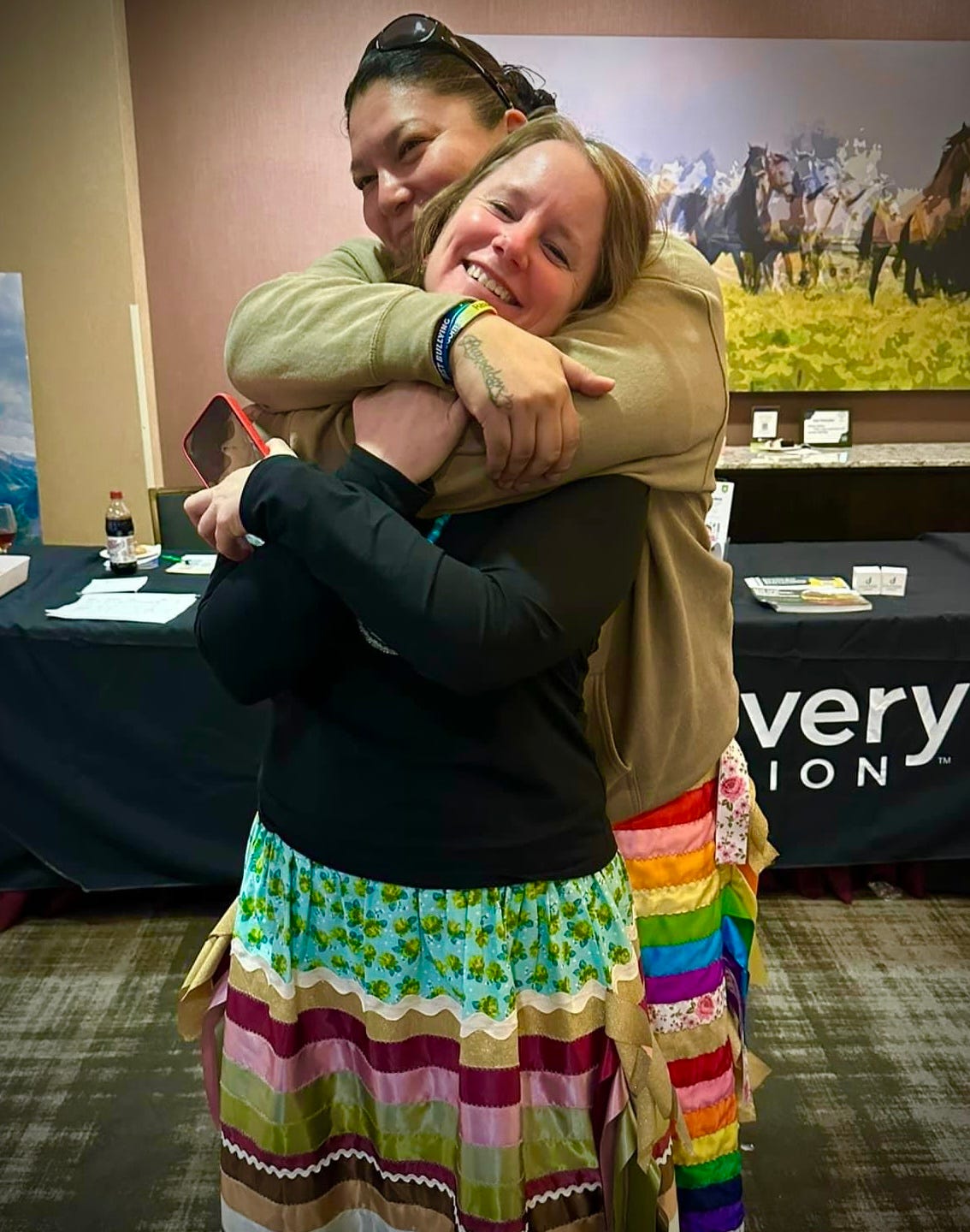Last week I had the good fortune to attend one of my favorite events, the Indian Education for All Best Practices conference, this year in Billings. It’s put on by the Montana OPI Indian Education Division, run by the most fantastic people you can imagine.1 This is a phenomenal event with excellent educators from all corners of the state and many of my friends that I had not seen in so long! Apologies to all those whose name-tags I had to peer at…
The Indian Education for All law is encoded as MCA 20-1-501 and it is is now 25 years old, the same age as my teaching career; I began in 1999 at the tribal alternative school, where I really needed the guidance the law could offer, learned so much over the years, and studied IEFA in my doctoral work a decade-plus later. A book called Indian Education for All, a critique of our law, rolled across my screen sometime last year. Long-ish story condensed…I asked all the IEFA people I knew if they’d been interviewed (no), and if they’d heard of it (mostly no), and then I ordered it. An academic from Washington named John Hopkins (Crow Creek Sioux) wrote it without consulting anyone at all from Montana. He cited many of us, yes, including me. But he didn’t call, or email, or interview anyone.
Since I wrote a whole entire dissertation on IEFA, I was befuddled and intrigued. I emailed him. He said, “I have been waiting for someone from Montana to reach out!”2 We had a 45-minute zoom conversation which was mostly pleasant, I thought. My initial plan was to delay until we’d established rapport before asking him why he didn’t contact anyone here for his book, but I failed at the wait. I may have lasted 6 minutes before blurting out my question. He replied that he didn’t want people’s opinions to affect his research.3 Why not make people’s experiences part of his research, I wondered. For example, someone like Denise Juneau could have provided invaluable insight from her tenures as director of the Indian Education division and state superintendent, but he simply cited her 2006 article. I offered to help him get to know some people here in case he wanted to do a follow-up article or chapter. He seemed kind of interested at first but I haven’t heard a word since.
I bring this up because Hopkins could have attended the IEFA conference and seen what is really happening. He is missing out, as is every Montana educator who has never attended it. There were sessions sharing curriculum resources, breakouts to discuss how to meet tribal students’ social-emotional needs, sessions with compelling titles like “Stars and Stories: The Morning Star People” and “Elk Morning: Battle of Arrow Creek” and “Centering Indigenous Voices in Historical Narratives.” Everything presented at this conference is applicable to classrooms.4
The fact is, many Montana educators have not attended the conference, for a variety of reasons. But IEFA is important and though many teachers mean well, they don’t have the background knowledge to pull off high quality lessons, despite the abundant resources available to them. Chickadee Community Services (the non-profit I direct) is offering an online Native American Studies for Teachers course this summer, where educators and others will learn more of what they need to know to better implement IEFA. This course is one way I envision to help solve the problem, rather than watching helplessly as teachers flounder through thickets of peril, trying to do the right thing while standing so far away from it. The course is available on a pay-what-you-can-afford basis, to help remove the price tag barrier. It’s one way I can contribute.
A quarter century on, Indian Education for All remains one of the beacons in Montana’s public education system. People come and go in teaching, and new teachers always need so much support. But to be our best educator selves, we must question, challenge, and always find ways to bring the truth to our students. This law, this conference, these people are critical to our efforts.
Chickadee Community Services sponsored the coffee/cookies afternoon snack and I’m here to say those cookies were stupendously delicious.
Which seems odd, since the communication lines appear to go both eastward and westward, but whatever.
His research’s thesis asserts that IEFA would be better when it is attached to a full decolonization of the education system and cites examples of how ineffective it has been due to its operation within a colonized system. Nobody disagrees that public education needs to change but…has he looked at public education lately? Really seen it, without its makeup and curlers? It lumbers along the highway with a WIDE LOAD banner across its backside, flanked by guide vehicles and pulling over at every chain up area to rest its old bones. Nobody’s decolonizing this behemoth anytime soon.
although not in the way he presents in his book, which again is a critique of the law.






I could write an entire essay I think just on THIS essay but I'll stick to this: revisiting that hug makes me verklempt. I was standing maybe ten feet away when it happened; it was warm and beautiful and really shows what this kind of work can be like when everyone is leading with their hearts and their spirits and operating in trust of one another.
What I also love is that in speaking to Winona Runs Above, she told me her mother in law is Iris Kill Eagle, who is one of my Little Shell Tribe's council members. Another perfect example of what I bleat about all the time, just how deeply related all of us are as tribal members in this part of the world. So many relationships! So many reasons to get along!
I'm very happy to have found a niche in the world of IEFA to lend a hand in. What an opportunity.